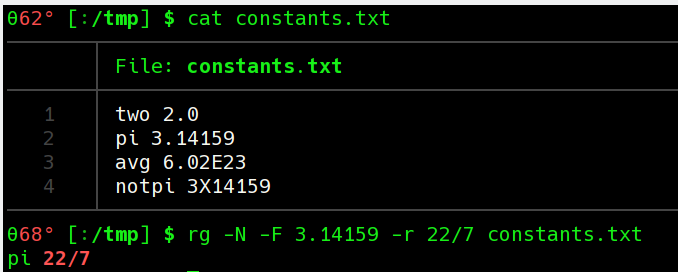If you are even a casual Linux user, you probably know how to use grep. Even if you aren’t a regular expression guru, it is easy to use grep to search for lines in a file that match anything from simple strings to complex patterns. Of course, grep is fine for looking, but what if you want to find things and change them. Maybe you want to change each instance of “HackADay” to “Hackaday,” for example. You might use sed, but it is somewhat hard to use. You could use awk, but as a general-purpose language, it seems a bit of overkill for such a simple and common task. That’s the idea behind ripgrep which actually has the command name rg. Using rg, you can do things that grep can do using more modern regular expressions and also do replacements.
A Note on Installing Ripgrep
Your best bet is to get ripgrep from your repositories. When I tried running KDE Neon, it helpfully told me that I could install a version using apt or take a Snap version that was newer. I usually hate installing a snap, but I did anyway. It informed me that I had to add –classic to the install line because ripgrep could affect files outside the Snap sandbox. Since the whole purpose of the program is to change files, I didn’t think that was too surprising, so I did the install.
Simple Usage
If you want to use rg as a grep, go ahead. One refreshing upgrade is that it does output line numbers when printing to stdout:
If you don’t want the line numbers, use the -N option. You can also specify a replacement with -r:
Suppose you wanted to create a new file with the replacement, though. In that case, send the --passthru option so that all lines are sent through even if they don’t match.
Conversely, you might want to only print out the parts that match and not the entire line. The -o option will do that. You can also use many grep-like options. For example, -v will invert the match so that only lines that don’t match print.
Overwriting
One of the classic problems with Linux multitasking is trying to overwrite a file. For example, try this:
cd /tmp cp /etc/fstab test.txt cat test.txt # plenty of stuff there cat test.txt > test.txt cat test.txt # oops, the file is now empty
This is a common use case for rg, though. Of course, you can send the output to a temporary file and then replace the original file with the temporary one. But that seems inelegant. A utility called sponge is a neater way to do it. Sponge copies its standard input to a file, but it waits until there is no more input before it does so. Replace the second line above with:
cat test.txt | sponge test.txt
So to make a replacement in a file you could use something like:
rg --passthrough 'Jen' -r 'Jennifer' invite.txt | sponge invite.txt
Flavors
By default, rg uses regular expressions from Rust. These are known to be fast, but have some limitations in the name of performance. You can use the -P option to select PCRE2 regular expressions which have more features but might be slower. Another option is to use --engine=auto. This will cause rg to use Rust expressions unless you appear to use features that require PCRE2. If you provide multiple expressions, they will all use the same expression engine, so any PCRE2 expression will force the use of that engine.
With the PCRE2 engine you can do look-around, backreferences, and more. If you have trouble quoting regular expressions when you just want to find some text, you’ll appreciate the -F option. This causes the search expression to be an ordinary string:
There are many other options. Try the --help option to see them all. You can match across lines, match binary files, use CRLF as a line terminator, show context lines, or filter each file through an external program.
Toolbox
This is one of those simple tools that you can certainly live without, but it is much nicer to do many common tasks with it than without it. Of course, to get the most out of any grep-like tool, you really need to know regular expressions. If you want a fun way to learn regular expressions, try a crossword puzzle.



















sed is definitely abstruse. It’s much easier to use awk or Perl. The first examples in awk become
awk ‘/alw/ {gsub(“alw”,”hackaday”); print FNR “:” $0}’
Simple substitutions are easy in sed.
sed -e ‘s/alw/hackaday/g’ –in-place test.txt
perl -i -pE ‘s/alwtest/hackaday/g’ /etc/passwd
But use straight quotes rather than the ‘curly’ Unicode quotes that this web site substitutes in comments without asking. Changing punctuation like that is not useful for discussing Unix tools …
I’ve never used ripgrep for text replacement but I use it all the time as a grep replacement because it’s VERY fast. Searching through gigabytes of files can be done in a reasonable amount of time. Very useful tool. It makes me seriously consider doing some exploration into adding the same regex packages to `less` to help speed it up a bit.
grep is fine for one off or irregular searches, but its limitations were brought home to me when I scripted firewall scripts using it for my server.
The scripts were to utilise the iptables and ipset firewall setup, by analysing the apache logs for malicious scans, POSTs etc.
and adding the offending IP to an ipset which determined future access.
I looked at top and found that the script which is run every 3 minutes, was taking nearly 2 minutes to complete.
I wrote a number of C++ functions which took an input file, output file and search pattern as arguments, slightly differing dependent upon whether inclusive or exclusive searches were required etc. and called these instead of grep in my script.
The script completed in 4.5 seconds!
I will definitely have a look at rg.
The big upside of grep is its readability compared to sed/awk/perl, even if it is at the cost of power.
Interested to see how rg compares.
Keep up the good work, we all tend to just sit with what we know and are comfortable with, good to get new ideas.
I find ack-grep is a pretty friendly version worthy of mention.
rg –passthrough ‘Jen’ -r ‘Jennifer’ invite.txt | sponge invite.txt
I’d be much more likely to use: sed -i ‘s/Jen/Jennifer/’ invite.txt
Linux distros sucks, rg is not available in most of them.
But recently added to Ubuntu/Debian:
https://packages.ubuntu.com/search?keywords=ripgrep
https://packages.debian.org/search?keywords=ripgrep